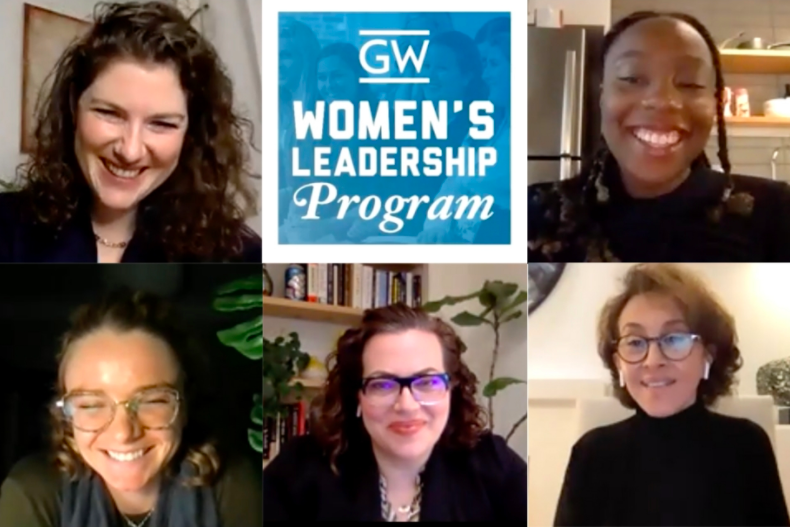March 07, 2021
By B.L. Wilson
At George Washington University’s 21st annual conference of the Women’s Leadership Program (WLP) Thursday evening, alumni discussed the ways the program helped them meet the challenges of social upheaval, natural disasters, environmental devastation and family histories of political and social oppression.
In welcoming the virtual attendees, Mary Buckley, WLP director and associate professor of dance in the Columbian College of Arts and Sciences, said, “Mount Vernon has a history of bringing women together in a shared common space, creating an extended family through shared living, learning and leadership.”
In addition to Mount Vernon board members and a host of alumni, the WLP was joined by GW Senior Associate Provost Koren Bedeau. Dr. Bedeau said she felt as if she “found her tribe,” while working on a program for women faculty who aspired to academic leadership. They worked together to discover the best ways “to exchange lessons and to maintain and build personal connections” that allowed women to feel comfortable and elevate the wisdom in the room.
Nazenin Ansari, B.A. ’80, and Meghan Shea, M.A. ’07, were this year’s recipients of the Elizabeth J. Somers award, which is named after the founder of the Mount Vernon Seminary and College. The award recognizes alumni who have contributed to society in meaningful ways and maintained a sustained relationship with GW and the WLP .
Ms. Ansari entered Mount Vernon College in 1978 as the daughter of an Iranian diplomat, only to discover a year later that she could not return to her country following the Iranian revolution. She is the publisher and managing editor of Kayhan London and Kayhan Life, two online publications that cover Iranian news and culture. It’s a job that she can trace back to her work as an assistant editor at ABC News Radio in Washington, D.C.
Her education in public affairs and government and her career in journalism helped her understand the importance of diversity, transparency, accountability and responsibility, she said.
“It is not just the big vessels of democracy like national elections but good governance where the daily experience of ordinary citizens with governance take place that counts,” she said.
Ms. Shea, the co-founder of Persistent Productions, which created the documentary celebrating the Women’s Leadership Program’s 20th anniversary, has had a career that has taken her to 30 countries to tell stories covering topics from global health and world religion to wildlife.
She said the foundation for her work with filmmakers, cinematographers, editors, scientists, naturalists, activists and academics was laid in the WLP, where she engaged with a diverse group of classmates about “different cultural perspectives, women, the arts and [built] relationships with peers and friends who shared these and other interests.”
A panel discussion, moderated by Ms. Shea, included Jenna Ben-Yehuda, B.A. ‘02, CEO of the Truman National Security Project; Olivia Elder, B.A. '18, an associate at Criminal Justice Reform; and Chloe King, B.A. ‘19, a Marshall Scholar and a student at the University of Edinburgh, where she is a candidate for a master’s degree in marine systems and policy. Ms. Shea asked panelists how the idea of service and having a social impact shaped their careers and personal journeys.
Ms. Elder said her introduction to politics and social systems came early when she was nine years old and her family was forced to leave their home in New Orleans after Hurricane Katrina. “I remember asking my mom... "how come the people that are hurting, that are crying, that are dying, how come they look like us? It seems unfair,’” she said.
It became her mission “to fix it,” she said. The WLP helped her overcome doubts about her ability to carry on the legacy of making change. “As I took the time to understand myself and the Black American experience,” Ms. Elder said, “I learned more about the communities I operated in. For me to succeed, for my grandparents to succeed, for my future children to succeed, we all need to be succeeding.”
Before entering GW as a first-year student, Ms. King took a gap year to work as a dive guide in Thailand and Indonesia where she became involved in marine conservation. It led her to change her area of study in international relations, with guidance from the WLP.
“I was able to go back to Indonesia on multiple, different scholarships and really immerse myself in learning the language and learning about the history and culture and conservation challenges of that region,” Ms. King said. “That has become my work, my life, my love, working in that region and working with the communities there.”
Ms. Ben-Yehuda, who has served as a mentor to many in the WLP, said as the child of Holocaust survivors, she got the leadership bug early on, running for president of her class in middle school. She said the country is currently dealing with “a confluence” of conflicts—including a crisis of trust, a breakdown of communities, deep existential threats to democracy and a “long-overdue reckoning on race. “A way of arresting this and seeing our way forward would be coming together through a shared vision of service to our country,” she said.


